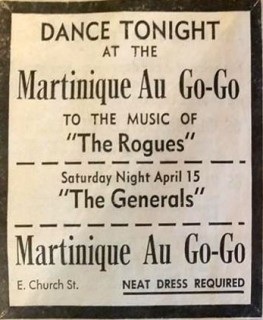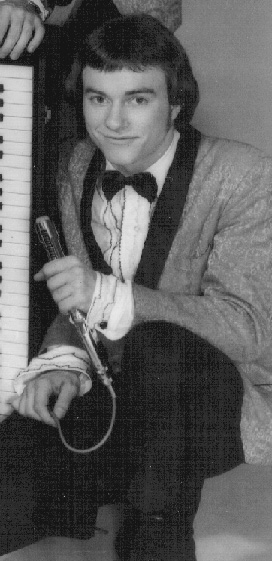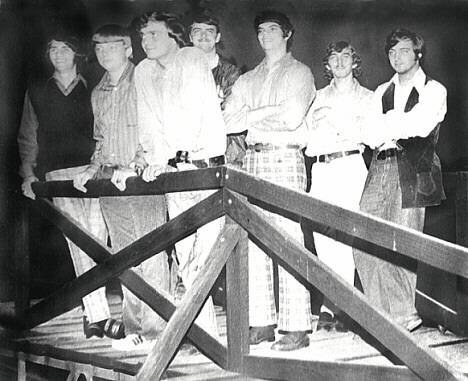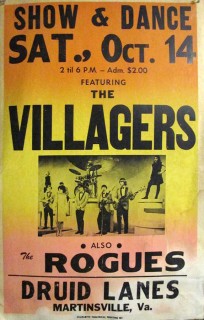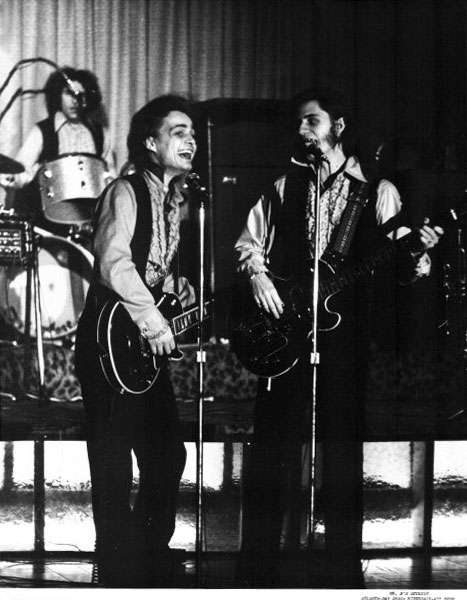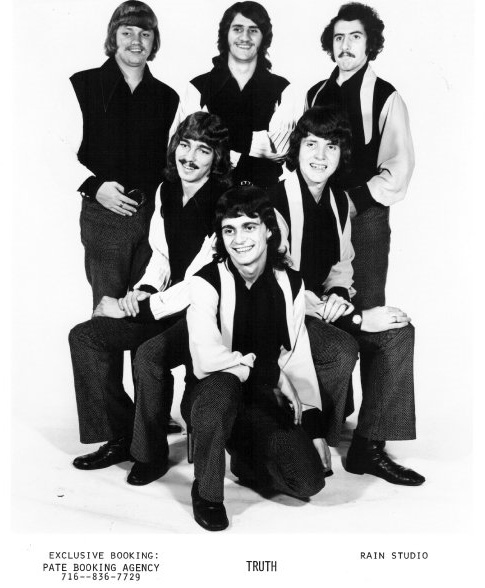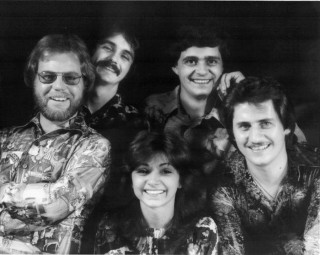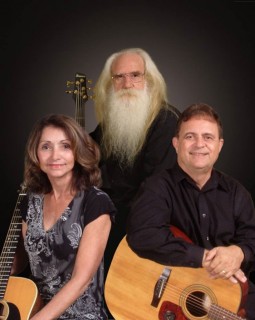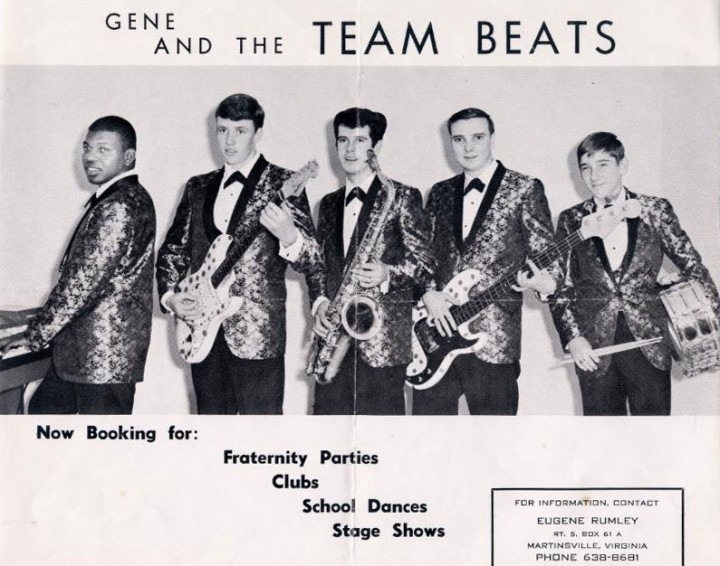
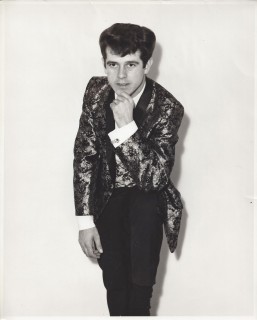
It has been nearly a half-century since five musicians from Martinsville and Danville banded together to form a group that would record just six sides over their decade together, but the music they created continues to gain fans and now reaches a far greater audience than was possible when they honed their skills in rural Virginia in the 1960s.
Gene and the Team Beats started their career as the Corvettes, an instrumental group led by Gene Rumley of Martinsville, who also played sax and booked the band throughout Virginia and the Carolinas. Carl Clarke (also from Martinsville) was the group’s original rhythm guitarist and joined the band near its inception in 1959. He remembers that the band originally performed as the Teen Beats, borrowing their name from a popular instrumental recorded by drummer Sandy Nelson. But when several of the members turned 20, Gene and the Team Beats were born.
The Team Beats performed mostly in Virginia, North and South Carolina and the DC area between 1959 and 1968. The band started recording late in their career, with all three 45s released between 1965 and ’67.
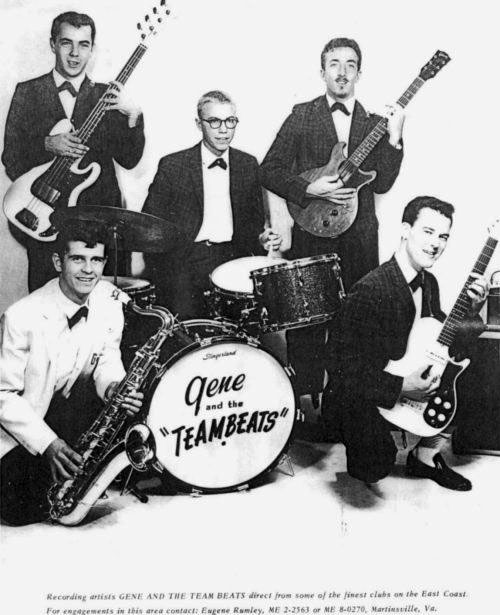
L-R: Butch Fox (bass); Dennis Porter (drums); Lewis Woodall Lead guitar); Carl Clark (rhythm guitar); Gene Rumley (sax)
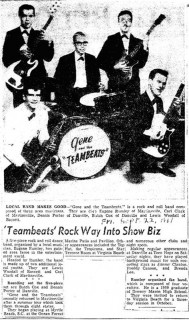
The Team Beats were especially popular in the Danville area and early performances saw the group backing recording artists Freddy “Boom Boom” Cannon, Brenda Lee and Jimmy Clanton at the local Coke plant. Clark recalls that the crowds were huge and even the local musicians were treated like rock stars. Butch Fox doubled on guitar and bass, while Dennis Porter played drums in the 1961 Team Beats’ configuration. Both commuted from Danville.
An article appearing in the Martinsville Bulletin in September 1961 recounts the band’s return from a summer tour which took them across eight states. They began playing in Myrtle Beach, S.C. at the Ocean Forest Marine Patio and Pavilion. Other appearances included the Top Hat, the Tropicana, and the Star Terrace Room in Virginia Beach.
Besides Rumley, bassist Carl Barrow had the longest history with the band, starting with the original line-up and continuing through countless personnel changes. Barrow’s bass can be heard on all three recording sessions. He first met Rumley when the future bandleader was “16 or 17 and he was working a night job as a curb hop at Sugar’s Drive-In, a small diner located in Martinsville on River Hill.” He remembers Gene had a strong work ethic and didn’t seem to mind holding down a full-time job, booking the band and driving the Team Beats to and from jobs in Virginia and the Carolinas.
But there were equipment problems early in their career, with Barrow blowing speakers at performances. He went to work with Clark and the pair designed their own cabinet. They mounted two 15 inch JBL speakers in a huge cabinet powered by a Fender amp. Other bands heard about the innovation and were coming to hear this “loud and very deep bass amplifier.” The huge tower was years ahead of the Marshall stacks of the sixties and even had a practical application, providing the band a safe hiding place when fights and gunfire cleared the dance floor.
Clark and Barrow’s paths first crossed when they attended separate high schools in Martinsville. Barrow remembers being blown away at an assembly at Drewry Mason High School when Clark took the stage playing guitar. This was before the Team Beats, but “Carl got them reelin’ and rockin’ with a Chuck Berry song; he could really play.”
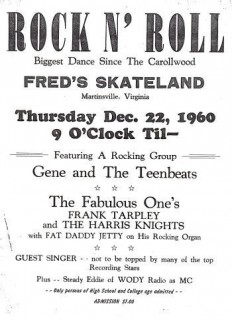
In the summer of 1961, the Team Beats were playing a night club in Norfolk — the Star Terrace Lounge — and living in a motel near Virginia Beach. With all of clubs booked at the beach, the band had to make do with the steady job in Norfolk. Clark recalls that “after a month or two some shyster talked us into going to Chicago, explaining that he had worked up a job for us there and we would be famous.”
All five members crammed into Rumley’s vintage Oldsmobile, pulling a wooden trailer covered with a tarp to the Windy City. On arrival, they discovered that the club manager had never heard of the band and had no interest in booking an unknown group from Virginia. Clark explains that “you had to be 21 to walk into the place, much less work there. We had been had by a manager who wanted us to leave (Norfolk) so his group could move in.”
The group piled back into Gene’s Olds and were trying to find their way out of Chicago when they “found this nice quiet road with no traffic.” With no place to stay and a long drive home, the band found a secluded spot by the water and went to sleep. The next morning they were preparing to leave but couldn’t understand why so many people were walking in the “road” and looking at them like they were from another planet. The band stopped the car and got out, only to be greeted by sirens and police cruisers coming through the woods in their direction. Gene and his compatriots were soon surrounded by the law. With guns drawn, they ordered the band to spread eagle and were promptly searched. Unbeknownst to the Team Beats, they had been driving on the sidewalks of Lake Shore Park.
The group was ordered to remove everything from the band trailer and all of their instrument cases were searched. With no machine guns in tow, Chicago’s finest finally realized that they weren’t dealing with criminals but “five dumb, redneck hillbillies from Virginia trying to become rock and roll stars.” They repacked their equipment and were escorted from the city by one of the officers. When they arrived at the outskirts of town, the cruiser stopped and the cop told them to “head that Oldsmobile south and don’t look back.”
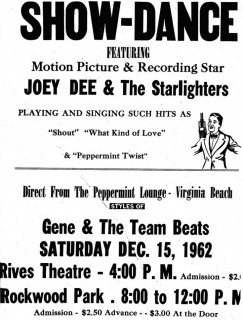
Clark married in 1963 and “found a shift job,” which didn’t jive with the night life and long hours required for road gigs on weekends. He left the band and music shortly thereafter but still plays, although he has switched to bass and Bluegrass music.
Lewis “Lew” Woodall of Bassett was the band’s original lead guitarist, and still performs with his own jazz quartet. He recalls the early years, when the band formed in 1959-60 as Gene and the Teen Beats. He says the band played about every weekend around Martinsville, Danville and Roanoke, frequently crossing the state border to play jobs for college fraternities. Woodall says in addition to the extended engagement at Norfolk’s Star Terrace, the Team Beats also played Virginia Beach’s Top Hat Club in the summer of 1961.
Woodall’s instrumental prowess was already legendary in Southside Virginia and Barrow says he had no rivals, calling him “the best guitarist anywhere around” and “way ahead of his time.” Barrow recalls that “Lew was getting sounds out of just his straight guitar without the fuzz box and pedals that came along years later.”
While the band was small in number, they were able to get a full sound because each member was an accomplished musician. They were primarily a soul and rhythm and blues band and Rumley points out that “Lewis (Woodall) and some of the guys hated playing rock and roll.”
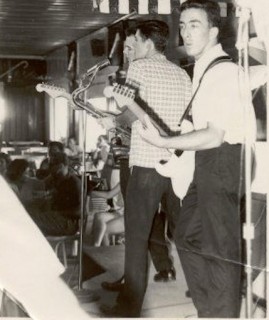
Gene and the Team Beats were the house band at the Peppermint Beach Club in Virginia Beach for the summer in 1962. The club was the sister of the renowned Peppermint Lounge in New York City and home of Joey Dee and the Starlighters of “Peppermint Twist” fame. The Team Beats played to a packed house during their two-month stint at the club. Between frat house engagements found by Rumley (aided by Bill Buckner) and the jobs secured by the group’s three booking agencies, there was seldom a weekend when the group wasn’t on the road.
One such weekend found the Team Beats in Greensboro in the dead of winter. Rumley drove the group’s blue Econovan, pulling a band trailer with the guys crammed inside the van. Barrow admits “it wasn’t highfalutin; we were lucky to get there at times.” The band finished their job about 1 a.m., loaded the trailer and Gene got behind the wheel. He was also working a day job for Gerber Foods at the time, so Rumley was tired. Barrow recalls that it was bitterly cold outside “and Gene was so sleepy that he would roll the window down and stick his head outside until he nearly froze. That would wake him up for a few minutes and when he was about to doze off, he’d do it again.” Barrow suggested that “maybe one of us should drive,” but Rumley would have none of it. They made it home safely but Barrow marvels that “we weren’t all hurt or worse.”
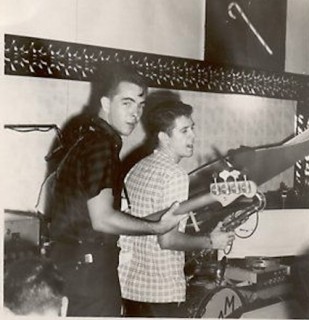
Wayne Motley was the band’s vocalist during this period. Rumley describes Motley as “an amazing showman and singer,” but with a troubled life that made him “hard to manage at times.” Motley, who also played guitar, keyboards and “just about anything but a horn,” was in and out of the band. Rumley explains that he “had to let him go a couple times (but) took Wayne back out of desperation.” He finally left the band for good after a minor scrape with the law.
Motley was fronting the group when the Team Beats won second place in a statewide battle of the bands competition in Richmond. Dressed in matching outfits and belting out a Jackie Wilson tune, the band took home $250 and new suits for each member.
Motley was already a veteran of the band scene by this time, starting at age 14 as a founding member of the Royal Kings, which played the club and college circuit in the Virginia Beach/Ocean View area. He would return to the Royal Teens after his ouster from the Team Beats. Barrow recalls seeing the band in Roanoke then and not recognizing Motley immediately because he was wearing a blonde wig.
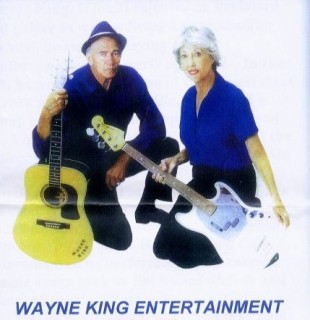
In later years, Motley recorded and performed with his wife, Katherine, in the Newport News area as Wayne “King” Motley. His three-hour show was interspersed with vintage rock and roll, country classics and an Elvis tribute. He continued entertaining at assisted living and retirement communities until just before his death at age 67. Barrow, Buckner and Lew Woodall visited Motley at his home a month before he died on August 18, 2012. Barrow says he was in good spirits and glad to see all of them after so many years. Bill Buckner, who was instrumental in promoting the band, died months later on April 2, 2014. He was 76.
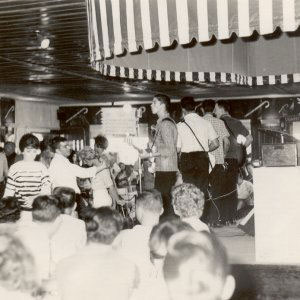
Lew Woodall remembers that in 1963, the band played a couple of months at the Twist Lounge at Nags Head. Nights found the band sleeping in a hot dog stand on the beach, with all five members crammed into a small cinderblock room and sharing a single sheet. Rumley recalls that “one night the guys left the sheet for me, but they’d wrapped it around a dead shark.” While the stand had “gone broke and closed,” the awning was still up and band members would be awakened by beachcombers who wanted a snack in the middle of the night.
Woodall left the Team Beats at the end of that summer when he transferred to Virginia Commonwealth University in Richmond. After graduating in 1965, Woodall was drafted and his brother, Lonnie, began playing with Rumley while Lew was in Vietnam.
The younger Woodall and Barrow shared an affinity for the same music and he recalls “Lonnie and I used to do a little soulful singing to each other.” The two were like brothers and Lonnie was already a regular on the bandstand, tagging along when Lewis was playing with the group. Lonnie picked up the guitar and “after a while we could see he was going to be a great guitarist. He joined the band and Lonnie took over where Lew left off.”
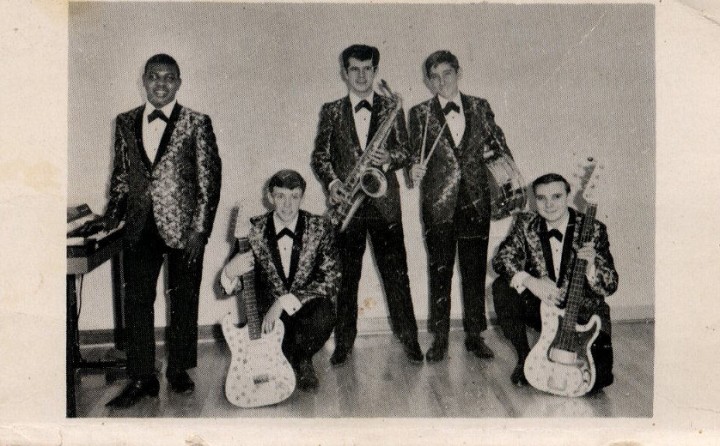
L-R: Charles Hairston, Lonnie Woodall, Gene Rumley, Rickie Fox, Brian Thomason
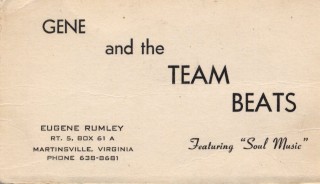 With Motley’s forced exodus from the band, Rumley was in need of a soulful vocalist. He found Charles Hairston by sheer tenacity, explaining that he went up Fayette Street in Martinsville saying: “Hey, we’re looking for a black singer to really represent our group with soul music… who’s a good singer?” Someone recommended Charles, who passed the audition and became the voice of the Team Beats. Gene says his contribution cannot be overlooked, and believes “Charles really made our band at that time.”
With Motley’s forced exodus from the band, Rumley was in need of a soulful vocalist. He found Charles Hairston by sheer tenacity, explaining that he went up Fayette Street in Martinsville saying: “Hey, we’re looking for a black singer to really represent our group with soul music… who’s a good singer?” Someone recommended Charles, who passed the audition and became the voice of the Team Beats. Gene says his contribution cannot be overlooked, and believes “Charles really made our band at that time.”
The addition brought some problems in the segregated South, where the band was refused service at a restaurant while returning from a fraternity gig at the University of Virginia. But having Hairston on vocals also allowed the Team Beats to play in some black clubs that were generally off limits to white bands.
There were some close calls, though. On one occasion the band was playing in the basement of an all black club in Martinsville when a woman accused her boyfriend of cheating and pulled a Saturday night special from her purse. She pointed the gun at the boyfriend and shouted: “I’m gonna blow your head off!” He ran into the women’s bathroom as the band scurried for cover, ducking behind the piano and amplifiers. With a staircase on each side of the bandstand, the patrons ran up the steps to the right as the irate female continued to wave her pistol in the other stairwell. The band had nowhere to go and remained in hiding until the standoff could be diffused.
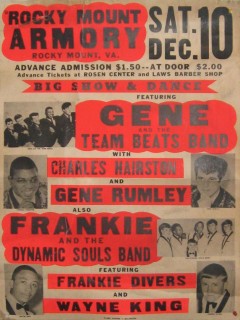
Rumley recalls another incident at a long since forgotten club “somewhere back in the sticks” of North Carolina. After agreeing to take the job, Rumley was contacted by Bill Buckner, who wanted to book the band for the same date. When Buckner learned where the Team Beats were scheduled to perform, he warned the bandleader that they were risking life and limb by playing there. But the gig paid about $300 and the band needed the money, so Rumley instructed Buckner to keep quiet about his reservations.
Rumley didn’t tell the band about the club’s reputation for violence, but instructed the guys to pull the old, upright piano away from the wall, in case they had to duck for cover. With just one door on the opposite end of the dance hall, he also made certain the window behind the bandstand was open, in case they had to stage a speedy exit.
The band was rocking about 1 a.m. when two gunshots rang out. That brought things to a standstill, but the partying resumed once the patrons realized the shots had come from the parking lot.
As the band was packing up for the night, Rumley inquired about the gunshots and learned that a woman had fatally shot her boyfriend.
The band was instructed to pick up their pay at another location. Rumley was returning to the van with the night’s receipts when he spotted a drunk standing by the van, talking to the musicians about the shooting that had happened a couple of hours earlier. Turns out he was also the local undertaker and, upon determining that the shooting victim had died, simply placed him on the back seat of his car and returned to the festivities. When the band declined his offer to view the body, the mortician drove on to the morgue. It would be the first — and last — time the Team Beats booked a job there.
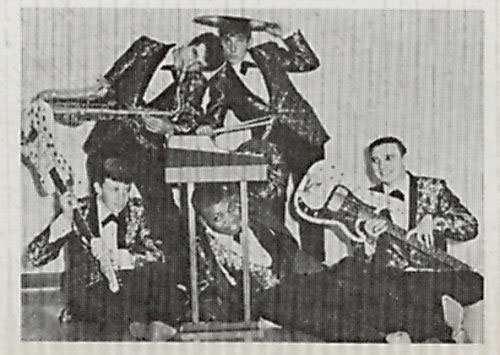 Musician and composer Rickie Fox was also an early member of the band and says one of his first performances as a Team Beat was at the Rathskeller, a downtown Danville nightclub located off Main Street, behind the Elk’s Lodge. Fox explains that his brother, Butch, got him into the group after one of the members (he’s not sure which) was drafted into the Army. Butch Fox switched to lead guitar and 12-year-old Rickie picked up the bass. Fox ended up playing with the group for about two-and-a-half years, first on bass, later on guitar and finally on drums. His drumming can be heard on the band’s first two records.
Musician and composer Rickie Fox was also an early member of the band and says one of his first performances as a Team Beat was at the Rathskeller, a downtown Danville nightclub located off Main Street, behind the Elk’s Lodge. Fox explains that his brother, Butch, got him into the group after one of the members (he’s not sure which) was drafted into the Army. Butch Fox switched to lead guitar and 12-year-old Rickie picked up the bass. Fox ended up playing with the group for about two-and-a-half years, first on bass, later on guitar and finally on drums. His drumming can be heard on the band’s first two records.
Butch was asked to leave the band after missing several rehearsals. Rickie was not yet old enough to drive and had no way to get to Martinsville “so Gene hired Brian Thomason to play bass” and bring the younger brother to rehearsals. Fox switched to guitar; Lew Woodall was drafted and Rumley hired his brother, Lonnie, to play guitar with Fox. Charles Hairston was the vocalist, Mickey Walker played drums and Rumley was on sax.
Fox shifted to drums when Walker was drafted and recalls driving to Sam Ash Music in New York, “where I bought a set of drums just like Ringo’s: black pearl Ludwig’s.”
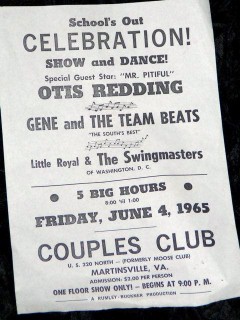
Fox says his most vivid memory is playing with Otis Redding in Martinsville on Friday, June 4, 1965. Fox recalls that Redding, then billed as “Mr. Pitiful,” was playing at the June German Ball, which was being held on Fayette Street in Martinsville. The “School’s Out Celebration Show and Dance” was billed as a five-hour show featuring Redding, with Little Royal and the Swingmasters of Washington, D.C. and Gene and the Team Beats as support acts. Fox says that Rumley and friend Bill Buckner had arranged for Redding to play for about an hour, with all of the bands using the Team Beats’ equipment “because they just kind of came in and then they went out.” According to Fox, the Team Beats were playing a club on 220 at the time and both he and Lonnie Woodall worshiped Little Royal’s guitar player, Robert Parker, stealing “every guitar lick we possibly could from him.” Little Royal was also quite a showman and emulated James Brown.
The Otis Redding show was at Baldwin’s Gymtorium on Fayette Street and attracted 3,000 fans. Rumley says the aging, two-story building had a balcony that circled the interior, with a high stage and a large dance floor. The Team Beats got the crowd warmed up and by the time they left the stage, “that place was jumping and the old wooden building was literally shaking.” He says when Otis Redding performed, the sound was “absolutely unbelievable.” Rumley recalls that the horn section from James Brown’s band had just defected to the “up and coming” Redding and says “they basically tore the roof off the place. That was one of the best jobs that we’d ever played.”
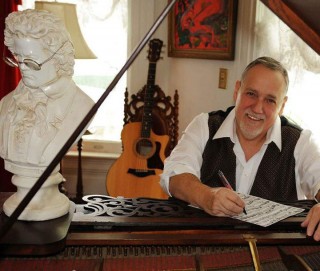
Fox was also with the band when the Team Beats opened for the Shangri Las at the Danville City Auditorium. The all-girl group was backed by a stellar English instrumental band, Sounds Inc. The group had recently performed with the Beatles and — like the Liverpudlians — honed their skills at the famed Star Club in Germany.
The agent for the show arranged for the Team Beats to travel to Washington, D.C. to play for other booking agencies. Fox remembers that they played a club with Little Willie and the Hand Jives. And while nothing ever came of the audition, Fox says they had a great time there.
The Team Beats performed with Sam and Dave, Percy Sledge and the Showmen. They also provided instrumental backing for Joe Simon, Inez Foxx, William Bell, the Kelly Brothers and Freddy Cannon.
Eddie Scott, who played drums after Fox left the group, says the show with Sam and Dave was especially memorable, since the Team Beats had the chance to join the duo’s huge band on stage. Scott remembers that the Team Beats “were the opening act (but) as the night wound down, we were able to play together, all of us. Sam and Dave and their group (were) on stage and then Gene and the Team Beats along with them… we were able to deliver a high powered performance.”
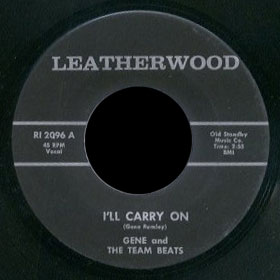 The Team Beat’s first single, “I’ll Carry On” b/w “Apple Fuzz” was released on Leatherwood (RI 2096) in 1965. Rickie Fox played drums on the session and says the band recorded the 45 not long after he joined.
The Team Beat’s first single, “I’ll Carry On” b/w “Apple Fuzz” was released on Leatherwood (RI 2096) in 1965. Rickie Fox played drums on the session and says the band recorded the 45 not long after he joined.
“I’ll Carry On” is credited to Rumley, while bothers Lewis and Lonnie Woodall are listed as composers of the instrumental, “Apple Fuzz,” which features nice jazz phrasing on guitar.
Rumley explains that for the first release, the band saved some money “from a couple of gigs, rented a studio near Rocky Mount somewhere and cut our first record, which we self-promoted.” Rumley describes the recording quality as “bad,” noting “there wasn’t much separation at all… probably one, two tracks because we were playing like we were playing in a nightclub and had the volume cranked up. When the sound came out, we were not too happy with it.” The single is distorted and poorly mixed and received little airplay.
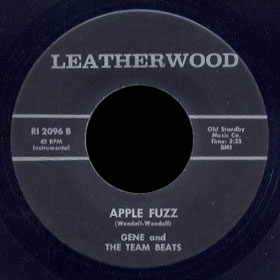 Fox insists it wasn’t recorded in a studio at all, but rather in the basement of a home in Rocky Mount. He was 12 at the time but remembers the night vividly. Fox says the band had played a job in Roanoke at the Sportsmen Club and “Gene had hooked up with some guy that had a quote-unquote ‘studio’ in his basement.” That night after the gig, the band went to his home and recorded “I’ll Carry On” and the flip side in a marathon session. Fox says the band was “literally there pretty much through the night.” While he knew little about recording studios at the time, Fox remembers “it was kind of primitive (and) I don’t think we did a lot of overdubbing or anything like that. It seemed like it was just a situation to record right onto a big reel-to-reel.”
Fox insists it wasn’t recorded in a studio at all, but rather in the basement of a home in Rocky Mount. He was 12 at the time but remembers the night vividly. Fox says the band had played a job in Roanoke at the Sportsmen Club and “Gene had hooked up with some guy that had a quote-unquote ‘studio’ in his basement.” That night after the gig, the band went to his home and recorded “I’ll Carry On” and the flip side in a marathon session. Fox says the band was “literally there pretty much through the night.” While he knew little about recording studios at the time, Fox remembers “it was kind of primitive (and) I don’t think we did a lot of overdubbing or anything like that. It seemed like it was just a situation to record right onto a big reel-to-reel.”
He says the setting looked nothing like a studio. Fox had just started playing the drums and when he listens to the 45 today, “I cringe because everything I like in a drummer now I didn’t do then; I was playing everything on the off beat… a lot of off beat snare drum hits and the ride cymbal was real heavy.” But he feels justified in that the record was “hastily done in somebody’s basement and there’s no telling what type of equipment he had.”
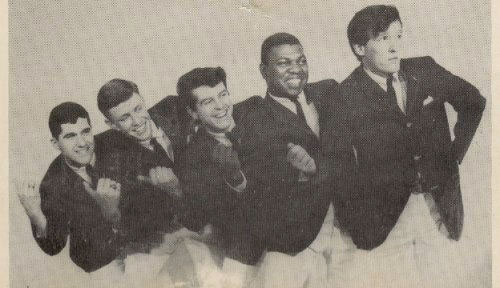
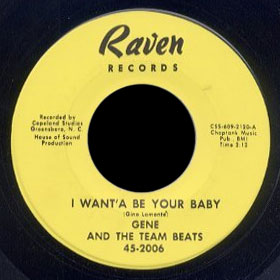 “I Wanta Be Your Baby,” and “I’ll Let Nothing Separate Me” were the group’s second and third 45 releases, respectively. Both were pressed in Tennessee by Nashville Record Productions, Inc. for Raven Records in Danville, although “I Wanta Be Your Baby” was actually recorded at Copeland Studios in Greensboro, N.C. Rumley doesn’t recall why they opted to record the single there, but believes it was because Copeland had better equipment than the fledgling House of Sound Studios on Old Piney Forest Road in Danville.
“I Wanta Be Your Baby,” and “I’ll Let Nothing Separate Me” were the group’s second and third 45 releases, respectively. Both were pressed in Tennessee by Nashville Record Productions, Inc. for Raven Records in Danville, although “I Wanta Be Your Baby” was actually recorded at Copeland Studios in Greensboro, N.C. Rumley doesn’t recall why they opted to record the single there, but believes it was because Copeland had better equipment than the fledgling House of Sound Studios on Old Piney Forest Road in Danville.
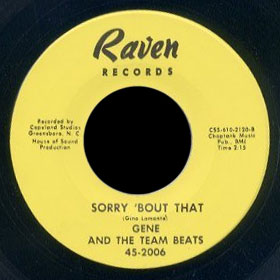 “I Wanta Be Your Baby” b/w “Sorry ‘bout That” was released in 1966 and was the first rock record in the Raven Records (Raven 45-2006) catalog and was among the label’s first releases. Writing credits for both sides are given to Gino Lamonte, although the Italian never existed. Rumley explains that he penned both sides; however, the band decided to create a composer pseudonym because they thought a European name would look more impressive on the label.
“I Wanta Be Your Baby” b/w “Sorry ‘bout That” was released in 1966 and was the first rock record in the Raven Records (Raven 45-2006) catalog and was among the label’s first releases. Writing credits for both sides are given to Gino Lamonte, although the Italian never existed. Rumley explains that he penned both sides; however, the band decided to create a composer pseudonym because they thought a European name would look more impressive on the label.
This was to be Fox’s swansong with the band and he recalls that Frank Koger, who ran the House of Sound and Raven Records, accompanied the band to Greensboro, along with Koger’s close friend Bill Buckner, who was managing the Leeds Music Store in Collinsville at that time. Fox remembers “it was the first time I’d ever gone to a real studio and the guy came running out and oiled my (squeaking) bass drum pedal and I was like: ‘Hey, what are you doing?’ I didn’t quite get it.”
The band was well prepared to lay down the plug side, but Fox recalls that the B-side was another matter, adding that the band would always make up something for the second side. “We would go to the studio with one song, which looking back on it is not very smart, and then we would just kind of make up something to go on the other side right there in the studio,” said Fox. The flip side was usually an instrumental, because the group didn’t have time to write lyrics. “And that’s how we made up that “Sorry ‘bout That,” which he says was created on the spot in the studio. Buckner laughs on the track and Koger can be heard saying “Sorry ‘bout That” at the end. Fox was in seventh grade at the time but still remembers the excitement of recording in an actual studio setting.
The personnel on “I Wanta Be Your Baby” is: Gene Rumley (sax and backup vocals); Charles Hairston (lead vocal); Lonnie Woodall (guitar and backup vocals); Rickie Fox (drums); Carl Barrow (bass).

In addition to Rumley and Buckner, the Team Beats had three agencies booking the band: Hit Attractions out of Charlotte, N.C.; Cavalier Attractions in Charlottesville, VA; and Southeastern Artists and Promotions of Florence, AL.
As he was too young to drive, Fox recalls that “when my ride (Brian Thomason) left the band, I had to leave, too.” He went on to form the Soulmasters with musicians from Danville and Eden, N.C. He played drums in the early Soulmasters, with Thomason on bass. Fox also played in the Majors, City Council, the Manchesters and Fox and Company. He continues to record, produce and perform today, both as a solo artist and with various bands.
To “promote” the record Rumley and the band’s drummer got in Gene’s car “and drove for two days from Danville to Richmond, up to a guy playing all kind of rhythm and blues out in Delaware. Just anybody who would listen to us we go into a studio and try and tell them who we were and what we were doing.” Apparently it worked, as “I Wanta Be Your Baby” was a regional hit and the group’s best selling 45. Bassist Alan Rowe remembers buying his copy at Leeds Music Center in Danville from Soulmaster Doug Hyler, who worked at the store when not on the road with his band.
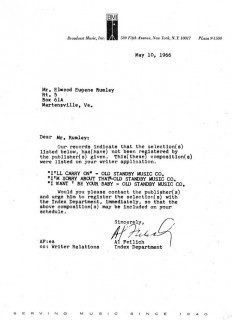
A letter from Broadcast Music, Inc. to Rumley dated May 10, 1966 lists the A-sides of both singles and “I’m Sorry About That,” urging Rumley to notify the publisher (Old Standby Music Co.) and have the songs registered with BMI as soon as possible. His experience was not unique. Two other Raven bands, Lost Soul and the Individuals, thought their songs had been registered, only to learn years later that the music licensing firm had no record of their recordings. Individuals’ bassist Tommy Redd kept the paperwork showing he paid Koger $6 to register two of his songs with BMI.
Interestingly, Koger recycled the single’s flip side without telling the band. “Sorry ‘bout That” can be heard as the instrumental backing to an otherwise forgettable B-side recitation (“I’m Fine”) recorded by Charlie Chandler (Raven HOS-45-2042 “The Drunken Driver” b/w “I’m Fine”) and released on Raven’s C&W subsidiary.
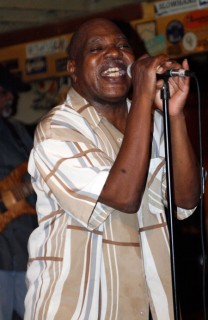
Most regard the Hairston line-up as the band’s best. Hairston would remain with the Team Beats until his conscription to military service. He would later be reunited with Fox in City Council, a horn band that toured extensively, performing original material and covers of popular songs that were given the band’s unique stamp through creative arrangements.
Hairston moved to North Carolina in the mid-70s. He remained a fixture on the Charlotte music scene until his death from prostate cancer in 2009 at the age of 61. As vocalist, he fronted the All Stars and is best remembered for being “the soul and energy” of the band’s Monday night performances at the Double Door Inn.
Hairston put on a memorable show for the Inn’s 35th anniversary in December 2008, just two months before his death. Fans say he was his usual self, sweating, singing and moving all around the stage. He last performed publicly at the Double Door in January 2009. By then the cancer he’d battled all year had taken its toll and he sang while sitting on a stool. Hairston’s mother and family visited from Maryland about a week before his death and he sang for them and the hospice staff. He was in good spirits and one in attendance described it as “a wonderful moment… and then he passed peacefully.” The Charles Hairston Memorial Foundation was established the following year.
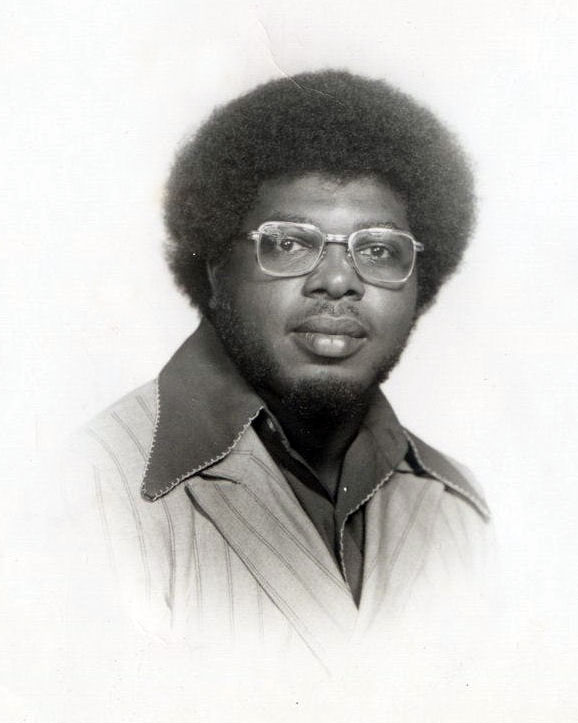
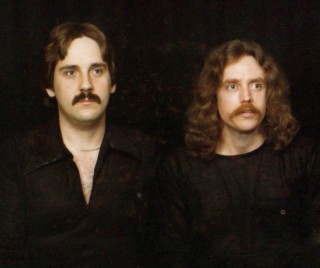
Guitarist Lonnie Woodall also died too soon, suffering a fatal heart attack on May 20, 2002. He was 54 and had recently attended a bands reunion in Danville that included many veterans of the Team Beats. He played with numerous local and national groups, including City Council, the Rogues, Fox and Company, Percy Sledge and the Blues Defenders. He was the owner of Woodall’s Music and was also instrumental in establishing Harrison Scales Young Musicians Foundation and worked closely with the Bassett High School Jazz Band.
Woodall is still remembered as a great guitarist and a soulful blues singer, but also as a friend to all. Barrow calls him his “brother” and Rumley said he was “always dependable, up-beat and loved music.” Gene says there were many times when he considered quitting, but “I could always depend on Lonnie being there when we had to start over with new people in the group: singers, bass players or drummers. I don’t know of anyone who did not like Lonnie; he was always learning, always caring and kind to everyone he met.”
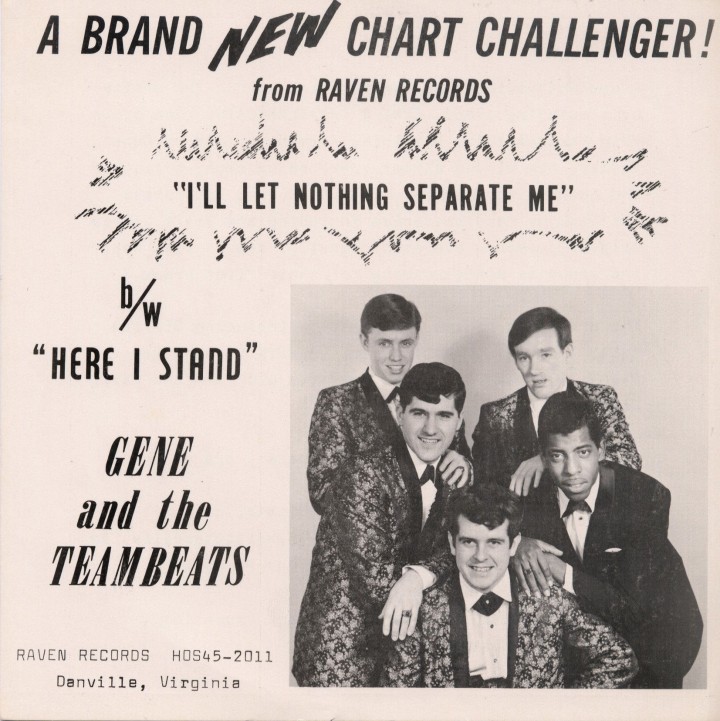
L-R: Lonnie Woodall, Carl Barrow, Gene Rumley, Eddie Scott, Jimmy Mitchell
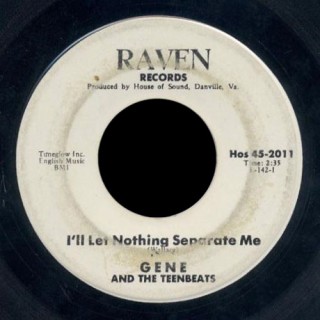 The band’s third and final release, “I’ll Let Nothing Separate Me” b/w “Here I Stand” (Raven HOS 42-2011) came out in 1967 and features a cover of an obscure song by the Wallace Brothers as its A-side. Early pressings featured a photo card insert of the band with a brief bio and booking information.
The band’s third and final release, “I’ll Let Nothing Separate Me” b/w “Here I Stand” (Raven HOS 42-2011) came out in 1967 and features a cover of an obscure song by the Wallace Brothers as its A-side. Early pressings featured a photo card insert of the band with a brief bio and booking information.
Since they were no longer writing their own material, Rumley explains that the members would “sit down and listen to old records,” then decide which tunes would be suitable for the group.” This time the group delivered what is arguably their best effort. And, unlike their previous releases, the B-side was no throwaway. “Here I Stand” stands on its own and is preferred by many to the single’s infectious plug side.
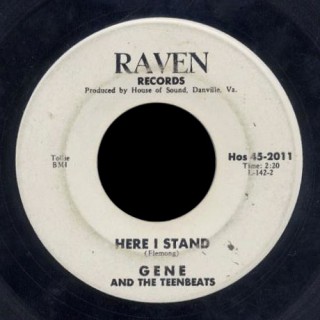 Hairston had been drafted and Rumley hastily recruited Martinsville’s Jimmy Mitchell as vocalist for the recording session, which also features Eddie Scott on drums. While Scott only appears on their last 45, he replaced Fox in 1966 and was with the Team Beats until the band called it a day two years later. He recalls passing an audition and recording at House of Sound Studios. Scott says the studio was small and there was very little overdubbing. As he remembers, “it was more or less cubicles and everything was recorded together… pretty much live to tape.” Mitchell sang lead, Rumley played sax, Lonnie Woodall was on guitar and Carl Barrow handled bass on the sessions.
Hairston had been drafted and Rumley hastily recruited Martinsville’s Jimmy Mitchell as vocalist for the recording session, which also features Eddie Scott on drums. While Scott only appears on their last 45, he replaced Fox in 1966 and was with the Team Beats until the band called it a day two years later. He recalls passing an audition and recording at House of Sound Studios. Scott says the studio was small and there was very little overdubbing. As he remembers, “it was more or less cubicles and everything was recorded together… pretty much live to tape.” Mitchell sang lead, Rumley played sax, Lonnie Woodall was on guitar and Carl Barrow handled bass on the sessions.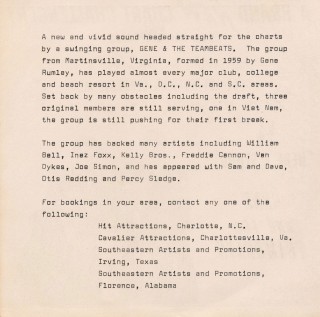
Mitchell was needed because “when Charles left we were missing that soul that only some people can bring to our style of music.” Rumley discovered Mitchell after again asking friends to recommend a good, soulful singer. He says Jimmy’s vocal styling fit the band perfectly. It didn’t hurt that he was a consummate “showman and front man.” By this point the band was moving in step on many of their numbers and Mitchell was a natural for the choreography, adding his own gyrations. Scott was also quite a dancer and Barrow recalls Eddie would hit the dance floor during breaks, “doing his best James Brown impression.”
Mitchell’s tenure with the band was brief. The singer married and left because it was too difficult to balance his day job with the band’s busy travel schedule. At some point he left Martinsville and Scott recalls that Mitchell later sang in clubs in New York City.
Barrow also left the band shortly before the break-up in 1968. Carl had been with the group on-and-off since he beginning but explains that he “went into commercial artwork” and the pressure of holding down a job and playing every weekend became too much.
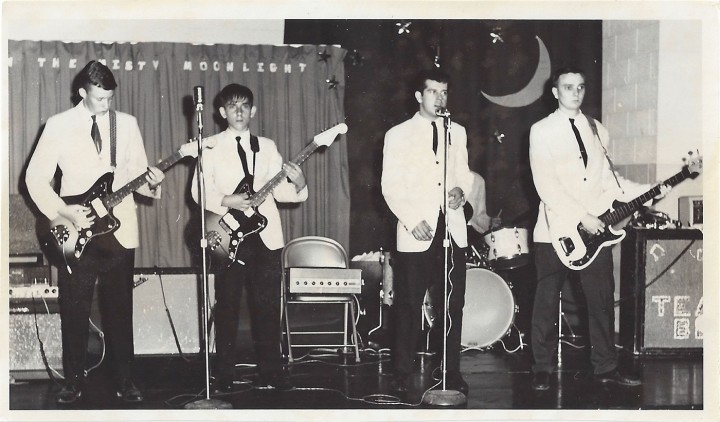
A fourth single release was planned and the backing track was recorded. The project was shelved after the group’s new lead singer, Alfonzo Martin of Martinsville, was also inducted into the military. Rumley regrets that the band was unable to add Martin’s vocals to their final recording session, describing his range as “unbelievable.” Martin served in the U.S. Army and rose to the rank of staff sergeant. He was killed by hostile fire in Vietnam.
The group disbanded shortly thereafter. Rumley points out that the band had been together nearly a decade and he had grown weary of replacing members who moved on to other bands, full-time jobs or were drafted and shipped out to Southeast Asia.
Scott moved to Myrtle Beach, South Carolina in 1996 and drove a truck until his retirement. He played in several bands over the years, including Martinsville’s Renegade Demolition Band in the eighties.

With the break-up, Rumley left touring behind and concentrated on a career. He spent more than 30 years in the business world, serving as president and vice president of multi-national corporations while leading training seminars throughout Asia-Pacific, Europe and North America. He was named “Business Man of the Year” by Alibaba.com, the world’s largest B2B search engine. While his home is in Florida, Rumley continues to travel extensively as a John Maxwell certified coach and teacher. But he is most passionate about his work with children in India, where he founded Mission for Orphans, a non-profit organization that helps feed, clothe and educate street children and orphans.
But rarely a day goes that he isn’t contacted by a follower of the music his band created nearly fifty years ago. The songs have stood the test of time, and Gene and the Team Beats live on through the dedication of Beach Music fans on the East Coast and lovers of Northern Soul in the United Kingdom.



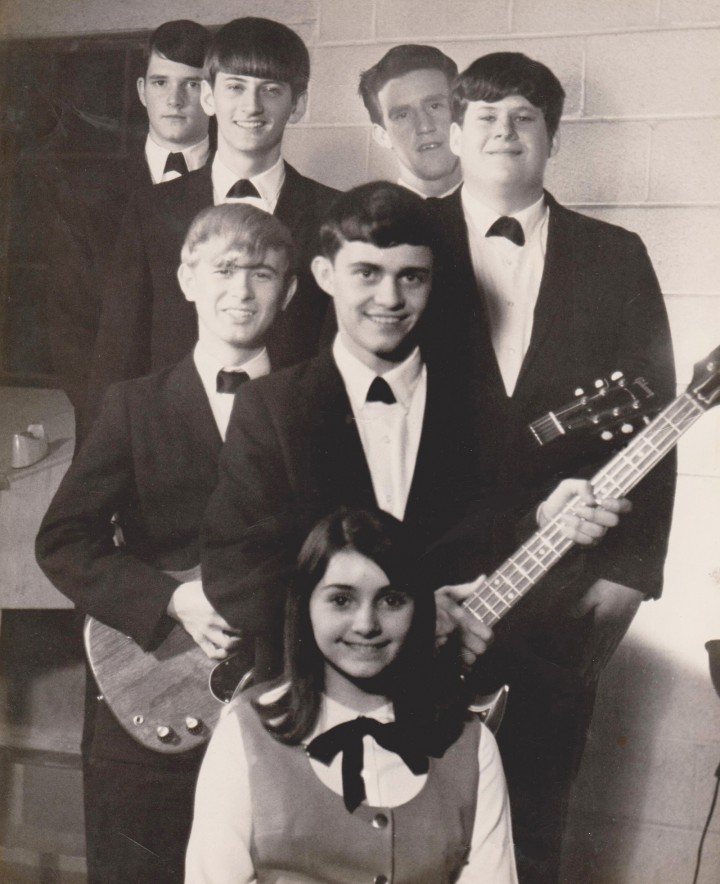
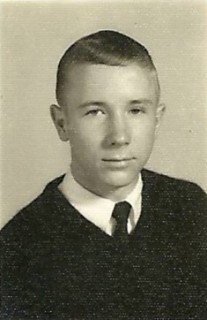
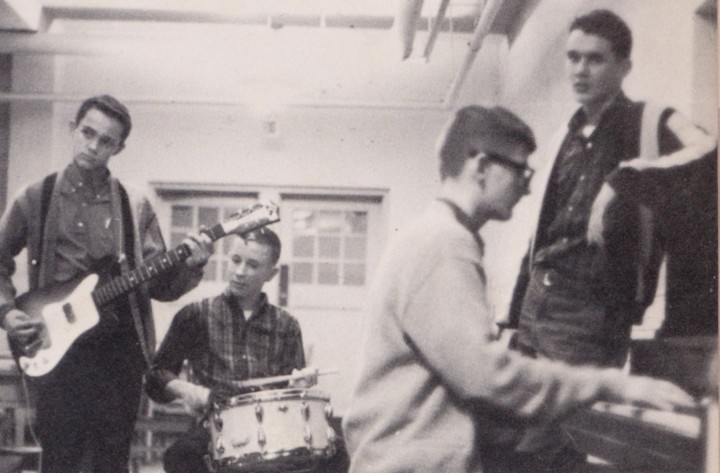
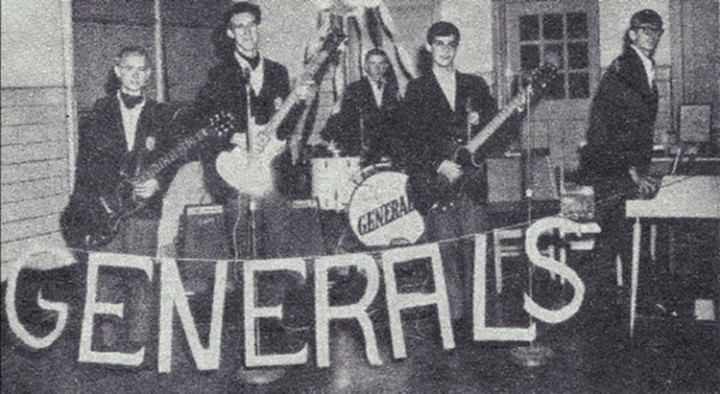
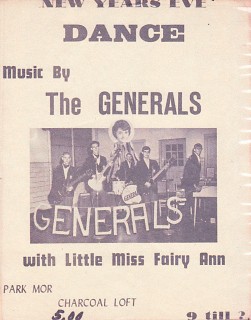
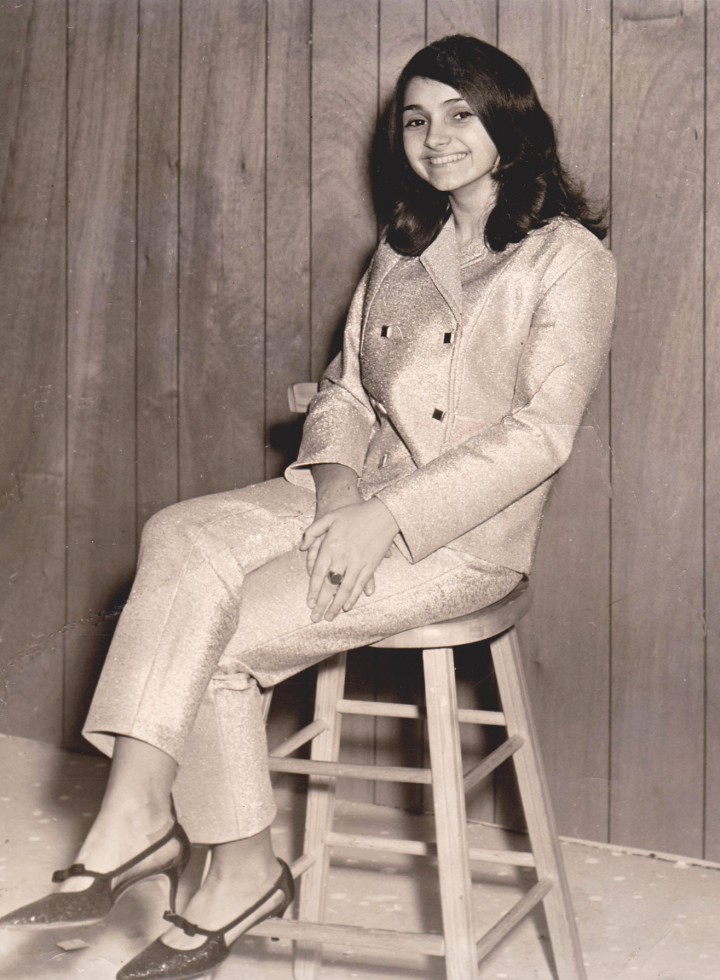
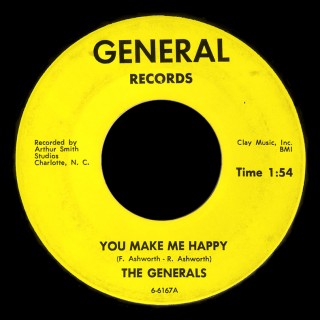
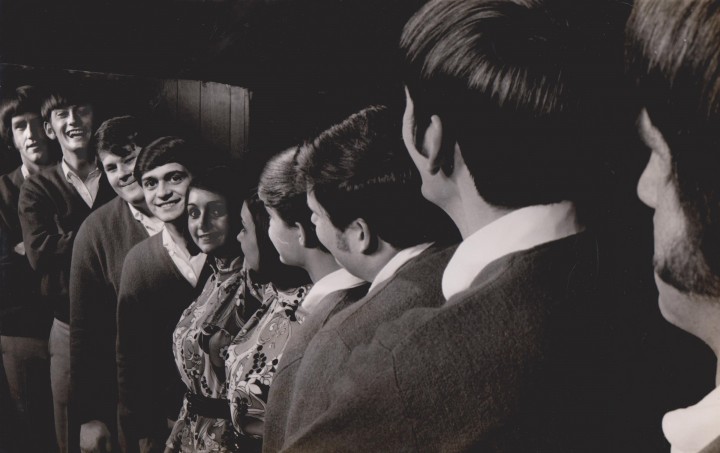
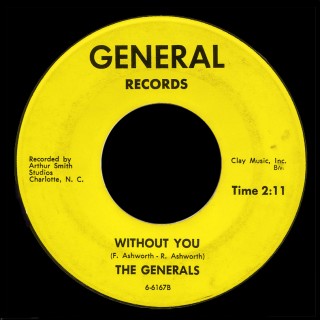
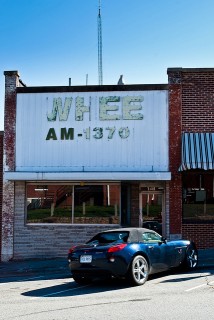
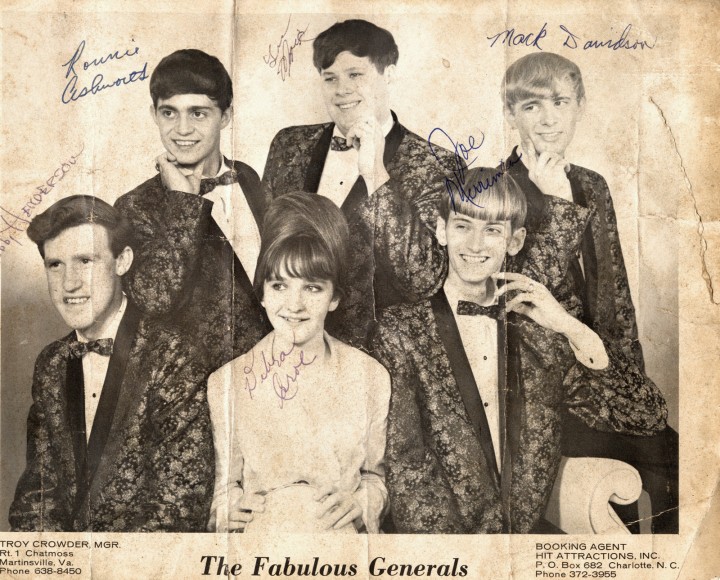
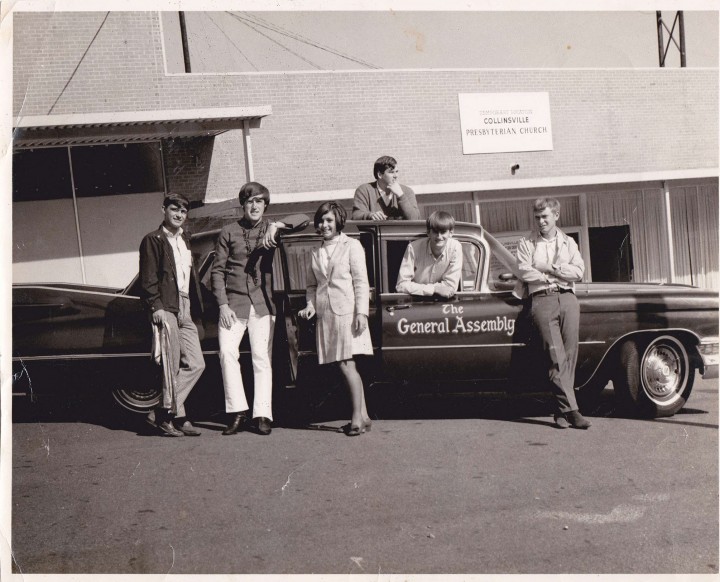
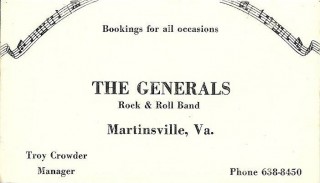
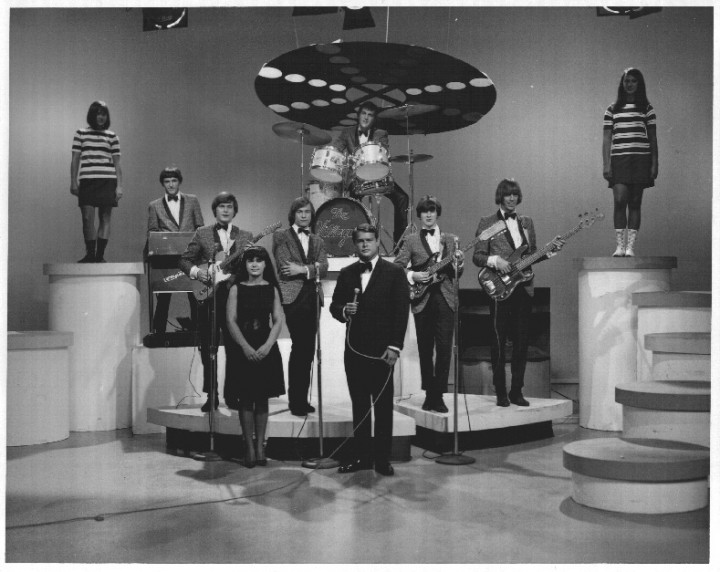
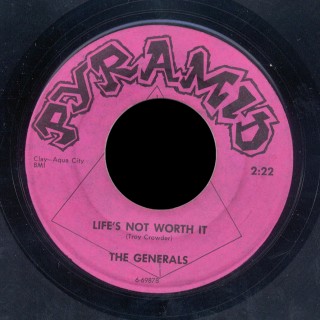
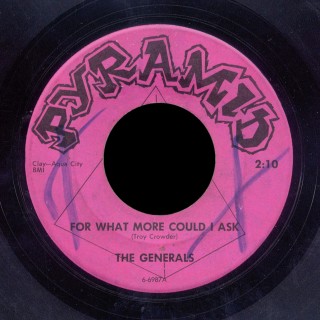 The group financed this release and Henderson says members again made a conscious decision to record original material, pointing out that their band “wrote a lot of the music we did in our live shows (some of which was never recorded) and even the covers that we did took on a personal flavor.”
The group financed this release and Henderson says members again made a conscious decision to record original material, pointing out that their band “wrote a lot of the music we did in our live shows (some of which was never recorded) and even the covers that we did took on a personal flavor.”